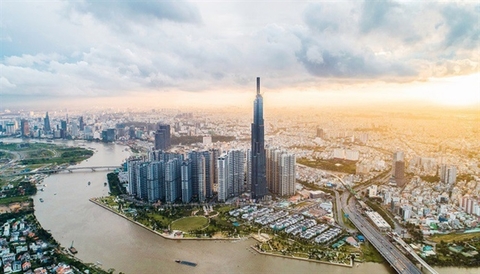
Vingroup's Vincom Center Landmark 81 in HCM City. Vingroup has recently sold US$1 billion worth of shares to the South Korean SK Group. — Photo vneconomy.vn
One year after failing to enter MSCI’s watchlist for a market status upgrade, it is still uncertain if Viet Nam will make it this year despite efforts made to improve market conditions.
In June 2018, Morgan Stanley Capital International (MSCI) rejected Viet Nam’s inclusion on its watchlist for a market status upgrade from “frontier market” to “emerging”. Instead, MSCI raised the status of Argentina from a frontier market to an emerging one and put Kuwait in the watchlist for the next upgrade.
Argentina and Kuwait were on the MSCI Frontier Markets Index before the review last year.
The Vietnamese Government considers MSCI’s watchlist as a top-priority target this year as it could lure a huge amount of foreign capital to the Vietnamese economy.
“We really hope MSCI will include Viet Nam in its watchlist this year. We have been making the best efforts to improve the legal framework, introduce new securities products and make the market more professional,” Nguyen Thi Bich Nga, deputy director of the State Securities Commission’s International Co-operation Department, told local media.
According to experts, Viet Nam has met more standards of an emerging market than similar markets such as Pakistan and the Philippines.
Viet Nam not only met the MSCI requirements of an emerging market but also had the best qualitative indicators among frontier markets, Kevin Snowball, executive of PXP Vietnam Asset Management, said.
There was a good chance that MSCI could put Viet Nam in its watchlist in the June review, Stephen McKeever, head of the institutional investor department at HCM City Securities Corp (HSC), said.
There were some reasons for that possibility, Stephen said. Prime Minister Nguyen Xuan Phuc supported the restructuring plan for the equity market until 2025 while the amendment of the securities law would make the market fair between domestic and foreign investors.
But Viet Nam should be careful as Argentina and Pakistan’s markets underperformed after they were raised to emerging markets. Analysts believed Viet Nam would not follow suit because its macro-economic conditions were considered positive.
It is estimated Viet Nam may receive US$10 billion worth of foreign capital from frontier market-focused funds and much more from emerging market-focused funds.
According to analysts, MSCI may want Viet Nam to take firm steps forward and mature enough before absorbing a huge amount of foreign capital. Foreign investors hold nearly $30 billion worth of assets in Viet Nam’s $173-billion stock market.
Opposite views
Bill Stoops, chief investment officer of Dragon Capital, told local media that Viet Nam might not get into MSCI’s watchlist this year and the decision could be made in 2020 if MSCI saw progress in Viet Nam’s trading system.
No one wants to see Viet Nam collapse as it did in 2006-07 when foreign investors sold-off their assets during the financial crisis, according to Bill.
The Vietnamese Government learned their lessons from the 2006-07 incident, Bill said, adding the election in 2021 might delay the admission of Viet Nam onto MSCI’s watchlist.
Investors should stay calm because there was little chance for Viet Nam to get into MSCI’s watchlist this year, Tran Anh Dung, director of VNDirect Securities Corporation’s Market Strategy Department, told Viet Nam News last Saturday.
“Even if MSCI does so, it will take Viet Nam a few more years to move to the emerging markets index because there are many things to be considered,” he said.
One of the problems that could affect MSCI‘s decision is the foreign ownership limit in domestic firms. The foreign ownership cap in Vietnamese firms was removed in accordance with Decree 58 issued by the Government in late June 2015.
That means foreign investors can purchase up to 100 per cent of a company’s total shares if that firm is not involved in businesses concerning the nation’s socio-economic safety and security such as banking, property and transportation.
Foreign shareholders can only own maximum 30 per cent of a bank’s shares. The rate for companies in the other two sectors is 49 per cent each.
Some local firms have been working to overhaul their business profiles to avoid foreign capital-limited sectors while local banks have tried to convince the market regulators to allow foreign investors to purchase more than 30 per cent of their capital.
New products have been discussed and issued to resolve the problems for foreign investors. Covered warrants will be launched in late June while non-voting depository right (NVDR) – another form of non-voting share – is expected to be approved by the National Assembly during its ongoing seventh meeting. – VNS